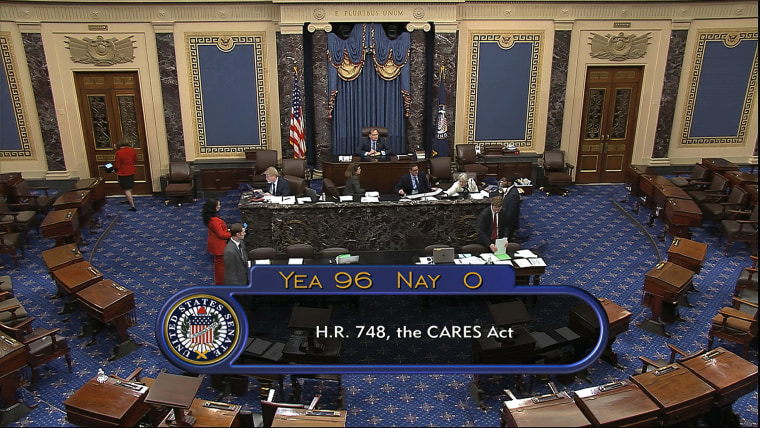Wall Street was having a very good day yesterday, right up until late in the afternoon. Most of the major indexes closed up, but the Dow Jones Industrial Average slid about 700 points in the last hour of trading, and it was likely a single press release had a lot to do the slide.
A trio of Republican senators -- Lindsey Graham (S.C.) Ben Sasse (Neb.), and Tim Scott (S.C.) -- said they'd discovered a "drafting error" in the economic rescue package negotiated by Senate leaders and the Trump administration. The GOP lawmakers, who were soon joined by Sen. Rick Scott (R-Fla.), pointed specifically to expanded unemployment insurance, which they said was too generous to many lower-income workers who'd lost their jobs as a result of the coronavirus crisis.
There was, of course, no mistake. These Republicans were simply prepared to hold up the bipartisan plan in the hopes of scaling back some of the aid to those who'd been laid off. All of a sudden, passage of the $2.2 trillion bill was in doubt.
Last night, however, cooler heads prevailed.
The Senate overwhelmingly passed a massive stimulus package late Wednesday meant to soften the economic blow of the coronavirus pandemic for American workers and businesses. The bill includes billions of dollars in credit for struggling industries, a significant boost to unemployment insurance and direct cash payments to Americans.
Sasse did propose an amendment to scale back provisions related to unemployment aid, and Republicans voted for the change, but it needed 60 votes and received 48. Soon after, the chamber advanced the package unanimously, with a vote just before midnight. Senators then left the Capitol, and they're unlikely to return before April 20.
There are plenty of worthwhile and detailed overviews of the legislation's main provisions, and by most measures, it's likely to do a significant amount of good, at least in the short-term.
But first, it'll have to clear the House, which may be trickier than it sounds.
According to the House Democratic leadership, the plan is to pass the economic plan tomorrow, sending it to the White House for Donald Trump's signature. The difficult part is figuring out how to pass it in a chamber where many members are already out and unavailable to vote, especially after their recent interactions with two lawmakers who've since tested positive for COVID-19.
House Speaker Nancy Pelosi (D-Calif.) yesterday suggested a vote by unanimous consent won't have the necessary support, but advancing the bill by way of a voice vote is an option. The Republican leadership, at least as of yesterday afternoon, was on board with the approach.
Watch this space.

